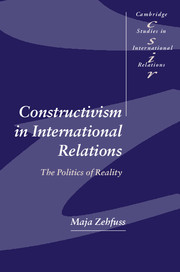Book contents
- Frontmatter
- Contents
- Acknowledgements
- List of abbreviations
- 1 Introduction
- 2 Identity change? Wendt's constructivism and German military involvement abroad
- 3 Intersubjectivity and the normative: Kratochwil's constructivism and German military involvement abroad
- 4 Words and world: Onuf's constructivism and German military involvement abroad
- 5 The politics of ‘reality’: Derrida's subversions, constructivism and German military involvement abroad
- 6 The politics of constructivism
- Bibliography
- Index
- CAMBRIDGE STUDIES IN INTERNATIONAL RELATIONS
4 - Words and world: Onuf's constructivism and German military involvement abroad
Published online by Cambridge University Press: 22 September 2009
- Frontmatter
- Contents
- Acknowledgements
- List of abbreviations
- 1 Introduction
- 2 Identity change? Wendt's constructivism and German military involvement abroad
- 3 Intersubjectivity and the normative: Kratochwil's constructivism and German military involvement abroad
- 4 Words and world: Onuf's constructivism and German military involvement abroad
- 5 The politics of ‘reality’: Derrida's subversions, constructivism and German military involvement abroad
- 6 The politics of constructivism
- Bibliography
- Index
- CAMBRIDGE STUDIES IN INTERNATIONAL RELATIONS
Summary
Nicholas Onuf's project is to ‘reconstruct’ the discipline of IR by analysing how people construct social reality (WOM). He questions its traditional boundaries and aims to create a new paradigm of international relations which takes account of their political character and makes them part of social theory (WOM 1; see also 22, 27 and 36). This reconceptualisation is more than an academic exercise since the social world is created by human practices and ‘[c]onstitutive claims on behalf of social science disciplines, and the projects they engender, are among these practices’ (WOM 15; see also 106). Formulating a constructivist approach to international relations therefore at the same time represents a contribution to shaping international reality. Onuf's definition of a constructivist theory rests on the idea, developed in Anthony Giddens' structuration theory, that ‘people and society construct, or constitute, each other’ (WOM 36; see also C 59 and CM 7). The processes of construction and their institutionalisation are crucial to Onuf's conception of reality. In basic terms, human beings construct reality through their deeds. Crucially, these deeds may be speech acts. Speech acts in turn may, through repetition, be institutionalised into rules and thereby provide the context and basis for meaning of human action. This process is deeply political because rules distribute benefits unevenly. In other words, rules privilege some people over others. The effect is rule.
Onuf's constructivism revolves around the related concepts of speech acts, deeds and rules.
- Type
- Chapter
- Information
- Constructivism in International RelationsThe Politics of Reality, pp. 151 - 195Publisher: Cambridge University PressPrint publication year: 2002

